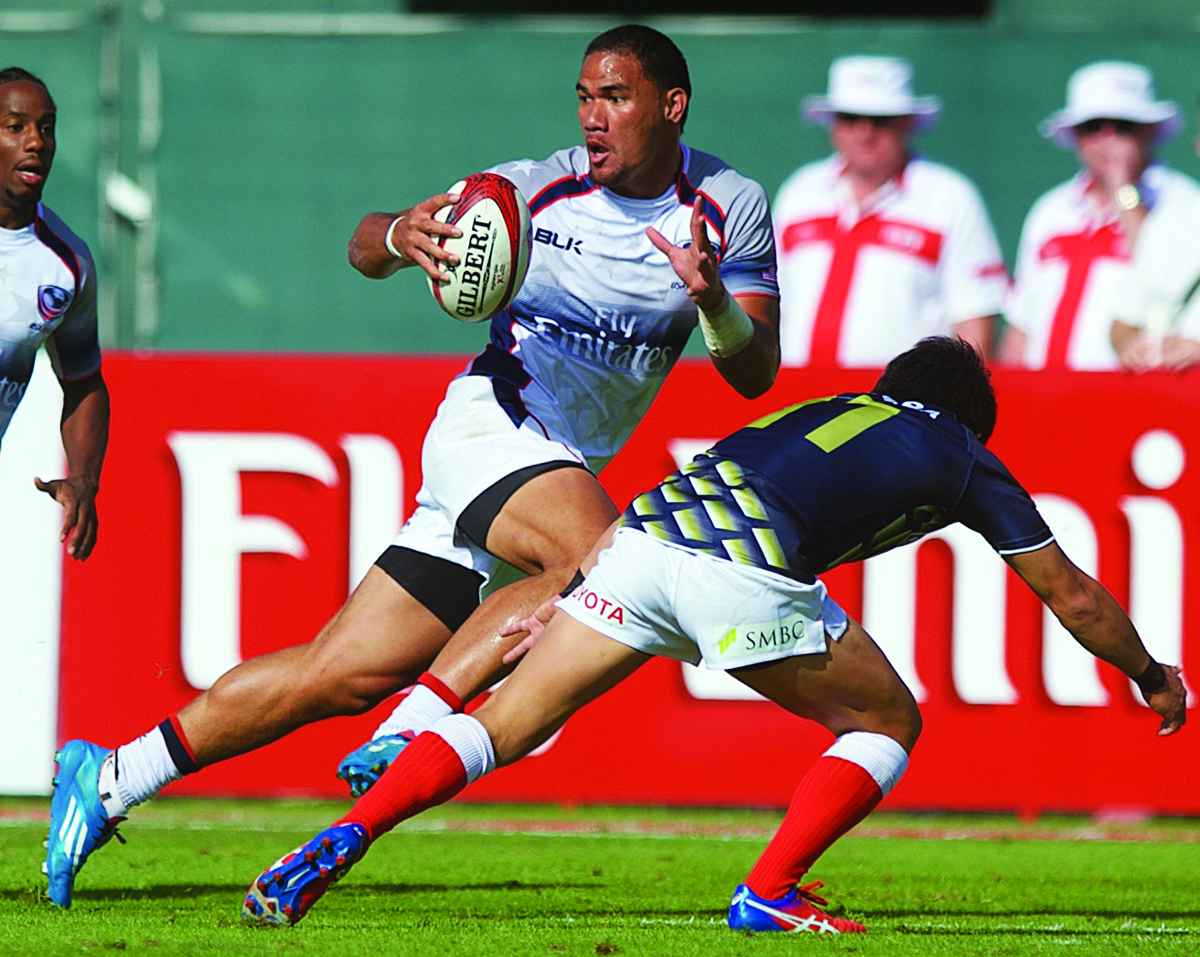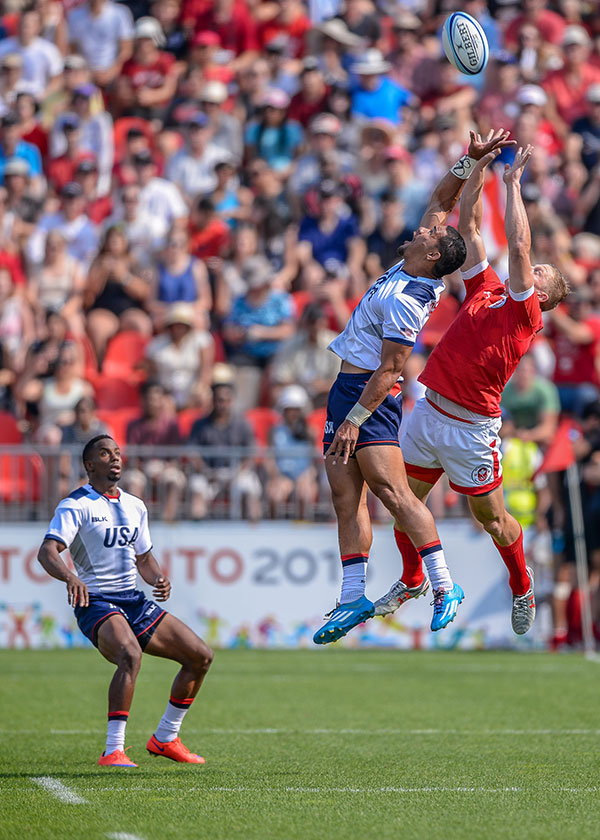- Editorial Offices
- 325 Brantly Hall
- Missoula, MT 59812
- (406) 243-2488
- themontanan@umontana.edu
- Icons By Maria Maldonado

The life of a student-athlete can be difficult and strenuous. It is hard to find the time to balance school, sports, and a social life. If you throw traveling the world and qualifying for the 2016 Summer Olympics in Rio de Janeiro into that mix, it may seem overwhelming. But such is life for current UM student Martin Iosefo.
Iosefo, who came to Montana with a dream of playing football, instead finds himself a member of the United States national rugby team. The Hawaii native played club rugby at UM, and in just a couple of short years, Iosefo launched himself to the international level at a blistering pace.
The Montanan sat down with Iosefo to see just how he embarked on this incredible journey.
How does somebody who plays rugby at UM, where there is only a club team, get selected for the United States national team?
Well for me, with the help of [UM Assistant Sports Information Director] Eric Taber, I was set up with a team in Chicago last summer. That’s where I played competitively with a team called the Chicago Lions.
And playing with them got you on the radar?
Yeah, playing with them really helped. It’s nice playing with a team as good as they are. We ended up going to nationals last summer in Seattle at the soccer stadium, and that’s where all of the coaches and scouts were at, too. I didn’t know anything about that, but I found out afterward that they noticed me playing with the Chicago Lions.
So what were your feelings when you first found out you would be playing for the national rugby team?
Oh man, I was excited. I didn’t expect any of this. I was just going out there to play the sport that I love, and when I heard that they were looking for me to come down to San Diego to try out for the national team, that was just the best feeling ever.
So you mention they e-mailed you. What is the process like for being selected for the national team?
I’m sure there are other ways that they go about scouting guys, but for me, after playing for the Lions, they set me up with a team called the Tiger Academy, they are a high-performance club. They are also kind of a scouting team, so [USA Rugby] set me up with them that same summer. They also flew us down to Australia for a month, and I played there with other international teams, which really helped. Then I got an invite to travel to San Diego, where they are based out of, to try out.
How big of an impact would you say the University of Montana has had on your international career?
It impacted it a lot. Skip Hegman, the coach here at the University, has a lot of connections with guys like Eric Taber. He also has really good connections with guys overseas, especially in New Zealand, so he helped me look at other options.
So do you still keep in contact with coaches and other players from the University?
I do, yeah. Whenever I am back in down I go out to their practice and run around with them, just to catch up and play some pick-up rugby.
Montana is a place you don’t really think of when talking about rugby. What are your thoughts on representing the state?
I’m glad that I’m in a position now that people are starting to notice Montana. It’s awesome for me because there are a lot of great athletes here. Like you say, people don’t really think of Montana as a rugby state at first thought, but for me coming out of Montana really helps, and people are starting to see what Montana rugby is all about.

You are from Hawaii, a state where rugby is very popular. How did you end up at UM, and what was your goal when you came to Missoula?
It was to further my education and to play football. At the time, I was still playing a little bit of rugby even though I wasn’t supposed to because of football. But I just couldn’t stay away from the sport. I just went out and practiced with the club team.
So what education did you come to Montana for? Did you have a major in mind that the UM offered classes in?
I was studying psychology with a minor in special education. I know they had a great education program here, and it was just something totally different for me. I wanted to go somewhere that I’ve never been, that was different than what I’ve been around my whole life.
Yeah, Montana seems like a pretty drastic change from Hawaii.
It really is. I wanted to experience snow. I really wanted to try snowboarding and seeing the outdoors. It was a big, big change for me.
Rugby is very popular in Hawaii. How long have you been playing the sport?
I grew up playing rugby as a kid, so I’ve been doing it my whole life. When I moved in high school I stopped playing because it was always during football at that time, but then I picked it up again when I came to college.
So have you been thinking about playing for the national team, or was that an out of the blue opportunity that you just took advantage of?
I have been thinking about it for a bit, but I didn’t really pursue it at the time because of school, and I was still playing football. But the more I got involved with (Eric) Taber and Skip Hegman, I started thinking more on the national level or possibly playing overseas.
What kind of an effect do you think that Eric Taber, who is also a UM graduate and Missoula native, has had on your career?
He has helped me a lot. He was on the board at USA Rugby, and he knew a lot of people and helped me get into the competitive league and playing with good clubs. It really set up the stage for me to get looked at by national teams.
Rugby is going to be back at the Olympics for the first time since 1924, and the United States has qualified. What kind of preparation are you going through to get ready to play on the biggest stage in the world?
For me, it’s basically following what my coaches are setting up for me as far as workout plans. I’m also working with Griz strength and conditioning coaches like Charlie Woida. And for me, just playing pick-up rugby whenever I can. It doesn’t matter what level, whether it’s club rugby here with the University or anything else. Everything counts for me. And then just staying healthy until the Olympics. I think getting into the season in December really will help me and the team prepare for Rio.
What kind of emotions are going to run through you as you go to Rio, you participate in the Olympic games, you walk through the parade of athletes at the Opening Ceremonies. Can you prepare yourself for that at all, or is it something you will just have to experience?
Well I was just in Toronto for the Pan-American Games, so I got the feel of how Rio is going to be. While it’s kind of like a mini-Olypmics, it was still exciting and it was fun to be around other athletes. I know Rio is going to be twice as big and have a bunch of promotions, but being around that environment really helped and playing in front of tens of thousands of people gave me a look at what Rio will be like. It gave me a little taste of what is to come.
For readers unfamiliar with rugby, could you tell us your position and what your job is during the game?
Well there are two types of rugby, there is Sevens, which obviously is seven on seven, and that’s what I play. Then there is standard rugby, where it is fifteen on fifteen with a mix of skill players and big dudes. In Sevens, there is a lot of space, so you are looking at a bunch of fast runners. It is just skill players, out on the open field, all playing offense and tackling.
Run us through the daily routine of an international rugby player.
On a regular day, we have weight training in the morning which goes on for forty-five minutes to an hour. Then, we are off to breakfast, then a second session in the afternoon that is another hour. We have lunch after and then a break for about two hours. Then we have a third session around six, so it’s basically like three-a-days every day throughout the week. And then prior to when we have a game coming up, we have a week-long camp. That goes from three-a-days to four-a-days, and it decides which player is going to the next tournament. We only pick twelve guys each tournament out of about twenty-something.So do you have a guaranteed spot for the Olympics in Rio?
Right now, nobody does. The spots are up for grabs, and it all depends on the player and how they do throughout the year. The final roster won’t be decided until the end of February.
How does the U.S. team stack up? How are we on the international stage?
This last season was the best that the U.S. has ever had. Last year we were ranked eleventh I believe, now we are sixth in the world. We have benefitted from bringing in coaches from England. They really changed everything for us and made us more of a competitor in the sport of rugby than just participators.
Do you think the United States has a shot at a medal when you travel to Rio?
We have a great shot. With the guys that we have been playing with, we have an opportunity to win it all.
What was your favorite class at UM?
I can’t remember off the top of my head, but it was one of my psychology classes.
What is the best music to listen to before a rugby match?
I like listening to reggae. I know it sounds weird, but I like to keep myself calm and collected before games. I like being relaxed, so I don’t overthink things.
What is your favorite sport outside of rugby?
It would have to be football or basketball.
What is your favorite football team?
The Arizona Cardinals
What is the best place to eat in downtown Missoula?
I like the Tamarack.
What do you do in your free time when you are not playing rugby?
I visit family in Phoenix. I love spending time with my nieces. I don’t see them around, and I believe that putting in time with family definitely pays off. I’ve been traveling the world so I don’t get to see them much.